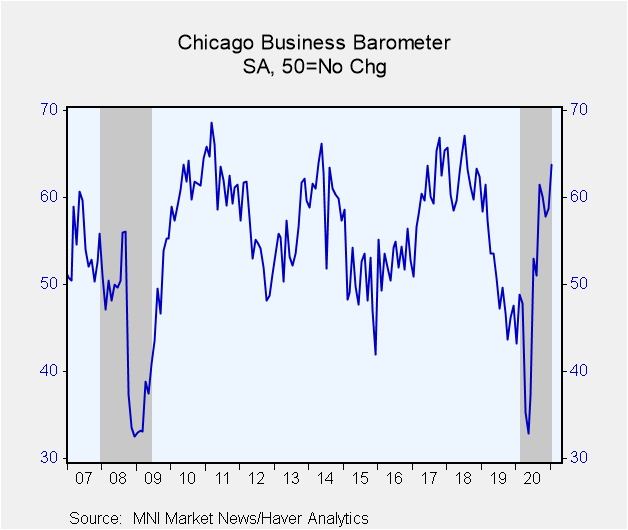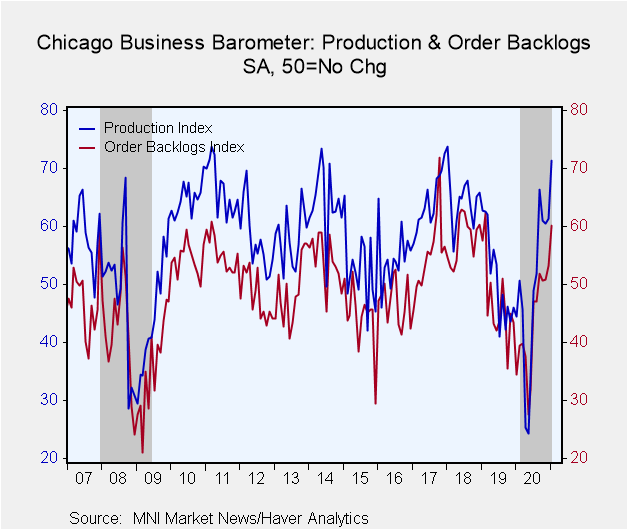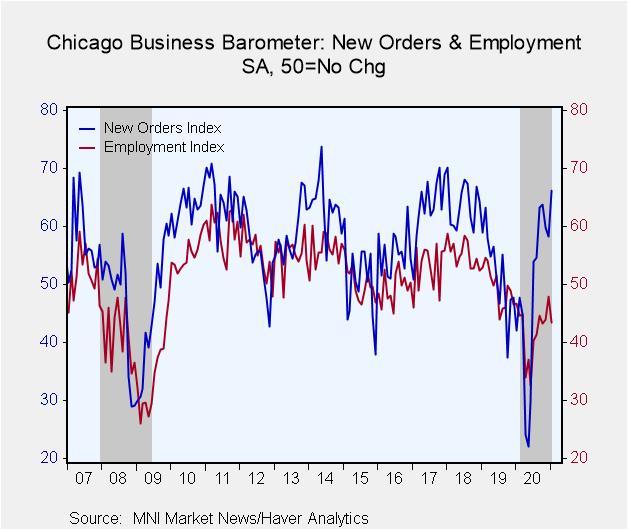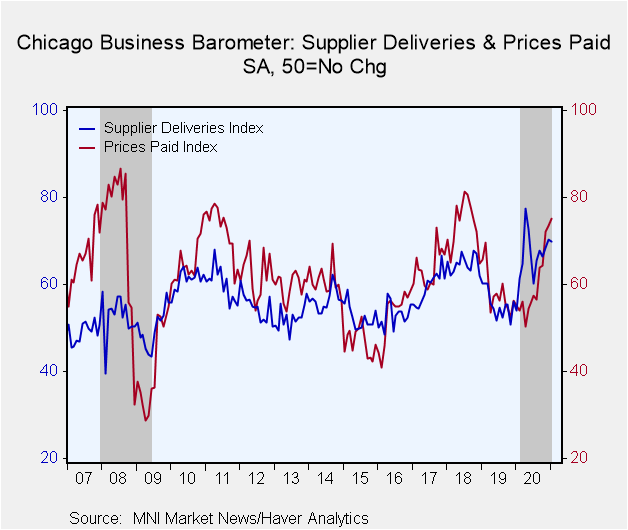 Global| Jan 29 2021
Global| Jan 29 2021Chicago PMI Notably Stronger in January
Summary
• Business activity index in Chicago rises 5.1 points. • Production, new orders, backlogs and inventories contribute to gain. • Employment index declined. The Chicago Purchasing Managers Business Barometer rose 5.1 points in January [...]
• Business activity index in Chicago rises 5.1 points.
• Production, new orders, backlogs and inventories contribute to gain.
• Employment index declined.
The Chicago Purchasing Managers Business Barometer rose 5.1 points in January to 63.8, the highest level since July 2018, when it was 67.1. The low last spring was just 32.9, experienced in May. The Action Economics Forecast had looked for the January reading to decrease to 58.5. A reading above 50 suggests growing business activity in the Chicago area.
Haver Analytics constructs an ISM-Adjusted Chicago Business Barometer with methodology similar to the ISM Composite Index. This measure rose to 61.2 in January from 56.4 in December and remained well above its low of 40.2 reached this past June.
Four of the components activity measures contributed to the increase in the overall index: production, new orders, order backlogs and inventories; all of those had sizable multi-point advances. Prices paid also rose while employment turned down and supplier deliveries softened.
Production advanced 9.9 points in January to 71.3, its strongest since January 2018. In contrast, the weakest production reading in the current business cycle was just 24.3 back in May. The next strongest component of business activity in January is, optimistically, new orders, which rose 7.9 points to 66.2. Its lowest reading was 22.1, also in May. Order backlogs gained markedly as well in the latest reading, 6.9 points, to 60.1. This compares to a May reading of 27.9. Inventories grew in the January survey, increasing 6.2 points to 55.1. Notably, the May reading for inventories was the highest during 2020, 52.6, indicating that reduced demand left companies with more stocks of merchandise, component parts and supplies.
The reading for supplier deliveries eased 0.5 points, but it was still high at 69.9. The press release suggests that freight backups and other logistical issues are keeping that reading elevated. The other component of the survey that showed a decline is employment, which decreased 4.5 point to 43.4. This thus remains relatively low, but its lowest during the recession has been 32.6, which is the least weak reading of all the survey components; so while related jobs aren’t growing yet in the Chicago area, they didn't plunge as dramatically during the spring as other measures of business activity.
The prices paid index showed a 1.7-point increase to 75.2 in January. Its recession "low" was 50.2 back in April, indicating that since the index didn’t fall below 50%, companies did not see overall price declines. Participants reported that they saw notable increases in the cost of steel.
The MNI Chicago Report is produced by MNI in partnership with ISM-Chicago. The survey is collected online each month from manufacturing and non-manufacturing firms in the Chicago area. Summary data are contained in Haver's USECON database with detail including the ISM-style index in the SURVEYS database.
| Chicago Purchasing Managers Index (%, SA) | Jan | Dec | Nov | Jan '20 | 2020 | 2019 | 2018 |
|---|---|---|---|---|---|---|---|
| General Business Barometer | 63.8 | 58.7 | 57.8 | 43.2 | 49.0 | 51.4 | 62.4 |
| ISM-Adjusted General Business Barometer | 61.2 | 57.4 | 55.8 | 45.7 | 49.6 | 51.5 | 60.8 |
| Production | 71.3 | 61.4 | 60.5 | 44.4 | 47.9 | 51.3 | 64.6 |
| New Orders | 66.2 | 58.3 | 59.9 | 42.1 | 47.1 | 52.0 | 63.8 |
| Order Backlogs | 60.1 | 53.2 | 50.8 | 34.5 | 42.6 | 46.9 | 58.0 |
| Inventories | 55.1 | 48.9 | 46.1 | 41.4 | 44.7 | 48.7 | 55.4 |
| Employment | 43.4 | 47.9 | 43.9 | 46.7 | 41.8 | 49.6 | 55.2 |
| Supplier Deliveries | 69.9 | 70.4 | 68.5 | 54.0 | 66.4 | 55.6 | 64.8 |
| Prices Paid | 75.2 | 73.5 | 72.2 | 55.1 | 59.5 | 58.5 | 74.0 |
Carol Stone, CBE
AuthorMore in Author Profile »Carol Stone, CBE came to Haver Analytics in 2003 following more than 35 years as a financial market economist at major Wall Street financial institutions, most especially Merrill Lynch and Nomura Securities. She had broad experience in analysis and forecasting of flow-of-funds accounts, the federal budget and Federal Reserve operations. At Nomura Securities, among other duties, she developed various indicator forecasting tools and edited a daily global publication produced in London and New York for readers in Tokyo. At Haver Analytics, Carol was a member of the Research Department, aiding database managers with research and documentation efforts, as well as posting commentary on select economic reports. In addition, she conducted Ways-of-the-World, a blog on economic issues for an Episcopal-Church-affiliated website, The Geranium Farm. During her career, Carol served as an officer of the Money Marketeers and the Downtown Economists Club. She had a PhD from NYU's Stern School of Business. She lived in Brooklyn, New York, and had a weekend home on Long Island.
More Economy in Brief
 Global| Feb 05 2026
Global| Feb 05 2026Charts of the Week: Balanced Policy, Resilient Data and AI Narratives
by:Andrew Cates









